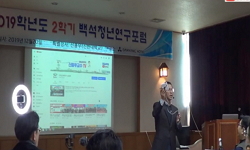This paper aims at finding a relationship between Oh Jang-hwan's poetry and Baek Seok's poetry, clarifying Oh Jang-hwan poetry's thematic consciousness, and characterizing the inner logic of Oh Jang-hwan's early poetry. This kind of work helps finding...
http://chineseinput.net/에서 pinyin(병음)방식으로 중국어를 변환할 수 있습니다.
변환된 중국어를 복사하여 사용하시면 됩니다.
- 中文 을 입력하시려면 zhongwen을 입력하시고 space를누르시면됩니다.
- 北京 을 입력하시려면 beijing을 입력하시고 space를 누르시면 됩니다.

백석 시와의 연관성을 통해 본 오장환의 초기시 : 인간을 위한 문학의 옹호와 선택적 부정의 양상 = Oh, Jang-hwan's Early Poetry with the Relation of Baek, Seok's Poetry - The Literary Vindication of Humanity and the Aspects of Selective Denial
한글로보기https://www.riss.kr/link?id=A77052609
- 저자
- 발행기관
- 학술지명
- 권호사항
-
발행연도
2009
-
작성언어
Korean
- 주제어
-
KDC
811
-
등재정보
KCI등재
-
자료형태
학술저널
- 발행기관 URL
-
수록면
249-278(30쪽)
- DOI식별코드
- 제공처
-
0
상세조회 -
0
다운로드
부가정보
다국어 초록 (Multilingual Abstract)
However, Oh Jang-hwan does not reveal his commentary and critical attitude in the poems depicting the low class whom he empathizes or feels sympathy. This kind of tendency proves that Oh Jang-hwan's critical voice is not his own voice but an intentional one resulted by his poetic theory. The reason why he shows a critical attitude in his many poems in spite of this tendency is that he thinks criticizing the old customs, the false consciousness and the deceptive attitude of the Yangban [the upper class], human alineation of the capitalistic society, and the small businessmen is more important than sympathizing with the lower class. This kind of attitude tells that Oh Jang-hwan does not deny all aspects of the contemporary reality and tradition but negate them selectively differentiating between the objects of negation and the objects of empathy. The reason why the critical poems are more visible than the empathizing poems is that the object of denial is the structure of reality itself.
This paper aims at finding a relationship between Oh Jang-hwan's poetry and Baek Seok's poetry, clarifying Oh Jang-hwan poetry's thematic consciousness, and characterizing the inner logic of Oh Jang-hwan's early poetry. This kind of work helps finding out the logical reasons for the complex aspects of Oh Jang-hwan's early poetry. A desirable poem for Oh Jang-hwan is the one that reveals a poet's emotion, opinions, and visions. The 'sentimentalism' for him is the emotion that a true person has to feel when he confronts with the real life and the natural effect of the contents over the forms. On the one hand, Oh Jang-hwan's criticism for Baek, Seok is caused by this kind of reason. On the other hand, Oh tries to find Baek Seok poetry's good points, the characteristics of returning family and hometown and refinding a value of the present reality and the future directionality. The thematic tendency of Oh Jang-hwan's early poetry is perceiving the past with the present perspective and narrating the past with the vision for future. This kind of tendency is embodied in <Jongga [the head family]>.
However, Oh Jang-hwan does not reveal his commentary and critical attitude in the poems depicting the low class whom he empathizes or feels sympathy. This kind of tendency proves that Oh Jang-hwan's critical voice is not his own voice but an intentional one resulted by his poetic theory. The reason why he shows a critical attitude in his many poems in spite of this tendency is that he thinks criticizing the old customs, the false consciousness and the deceptive attitude of the Yangban [the upper class], human alineation of the capitalistic society, and the small businessmen is more important than sympathizing with the lower class. This kind of attitude tells that Oh Jang-hwan does not deny all aspects of the contemporary reality and tradition but negate them selectively differentiating between the objects of negation and the objects of empathy. The reason why the critical poems are more visible than the empathizing poems is that the object of denial is the structure of reality itself.
목차 (Table of Contents)
- Ⅰ. 서론
- Ⅱ. 「백석론」: ‘인간을 위한 문학’의 주창과 센티멘탈리즘의 옹호
- Ⅲ. 「여우난곬족」과 「종가」: 현재적 재현과 비판적 거리
- Ⅳ. 선택적 부정과 현실 비판의 양상
- Ⅴ. 남은 과제
- Ⅰ. 서론
- Ⅱ. 「백석론」: ‘인간을 위한 문학’의 주창과 센티멘탈리즘의 옹호
- Ⅲ. 「여우난곬족」과 「종가」: 현재적 재현과 비판적 거리
- Ⅳ. 선택적 부정과 현실 비판의 양상
- Ⅴ. 남은 과제
- 참고문헌
- Abstract
동일학술지(권/호) 다른 논문
-
- 한국시학회
- 오문석(Oh Moon-Seok)
- 2009
- KCI등재
-
- 한국시학회
- 윤여탁(Yoon Yeo-Tak)
- 2009
- KCI등재
-
- 한국시학회
- 오형엽(Oh Hyung-Yup)
- 2009
- KCI등재
-
- 한국시학회
- 최명표(Choi Myoung-Pyo)
- 2009
- KCI등재




 KCI
KCI DBpia
DBpia




